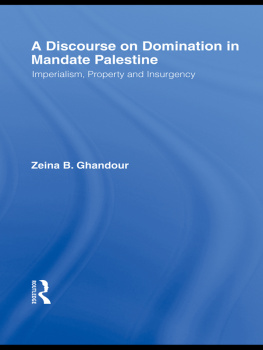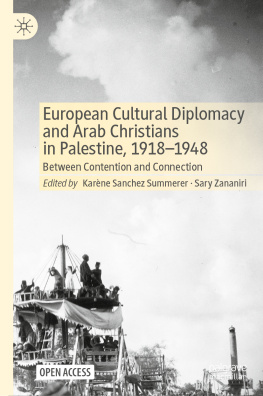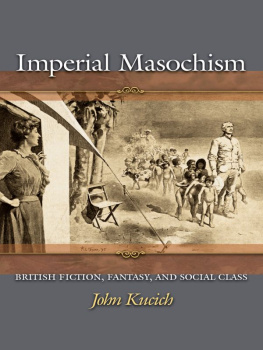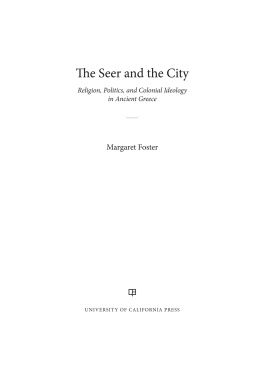A Discourse on Domination in Mandate Palestine
British discourse during the Mandate, with its unremitting convergence on the problematic of the native questions, and which rested on racial and cultural theories and presumptions, as well as on certain givens drawn from the British class system, has been taken for granted by historians. The validity of cultural representations as pronounced within official correspondence and colonial laws and regulations, as well as within the private papers of colonial officials, survives more or less intact. There are features of colonialism additional to economic and political power, which are glaring yet have escaped examination, which carried cultural weight and had cultural implications and which negatively transformed native society. This was inevitable. But what is less inevitable is the subsequent collusion of historians in this, a (neo-) colonial dynamic. The continued collusion of modern historians with racial and cultural notions concerning the rationale of European rule in Palestine has postcolonial implications. It drags these old notions into the present where their iniquitous barbarity continues to manifest. This study identifies the symbolism of British officials discourse and intertwines it with the symbolism and imagery of the natives own discourse (from oral interviews and private family papers). At all times, it remains allied to those writers, philosophers and chroniclers whose central preoccupation is to agitate and challenge author-ity. This, then, is a return to the Old School, a revisiting of the optimistic, vibrant rhetoric of those radicals who continue to inspire post- and anti-colonial thinking. In order to dismantle, and to undo and unwrite, A Discourse on Domination in Mandate Palestine holds a mirror up to the language of the Mandatory by counteracting it with its own integrally oppositional discourse and a provocative rhetoric.
Zeina B. Ghandour trained as a lawyer. She has since lived and worked in several of the worlds troublespots. Her first novel, The Honey, was published in 1999 and her short pieces have appeared in anthologies and magazines. She currently lives in London, where she teaches Law.
A Discourse on Domination in Mandate Palestine
Imperialism, Property and Insurgency
Zeina B. Ghandour

First published 2010
by Routledge
2 Park Square, Milton Park, Abingdon, Oxon, OX14 4RN
Simultaneously published in the USA and Canada
by Routledge
270 Madison Avenue, New York, NY 10016
A GlassHouse book
Routledge is an imprint of the Taylor & Francis Group, an informa business
This edition published in the Taylor & Francis e-Library, 2009.
To purchase your own copy of this or any of Taylor & Francis or Routledges collection of thousands of eBooks please go to www.eBookstore.tandf.co.uk.
2010 Zeina B. Ghandour
All rights reserved. No part of this book may be reprinted or reproduced or utilised in any form or by any electronic, mechanical, or other means, now known or hereafter invented, including photocopying and recording, or in any information storage or retrieval system, without permission in writing from the publishers.
British Library Cataloguing in Publication Data
A catalogue record for this book is available from the British Library
Library of Congress Cataloguing in Publication Data
Ghandour, Zeina B., 1966
A discourse on domination in mandate Palestine : imperialism, property and
insurgency / Zeina B. Ghandour.
p. cm.
Includes bibliographical references and index.
1. PalestineHistory1917-1948. 2. MandatesPalestine. 3. Colonial administratorsGreat BritainAttitudesHistory. 4. BritishPalestine Attitudes. 5. PalestineForeign public opinion, British. 6. Public opinion Great Britain. 7. ImperialismGovernment policyGreat BritainHistory20th century. I. Title.
DS126.G47 2009
956.94'04dc22
2009012897
ISBN 0-203-88084-6 Master e-book ISBN
ISBN10: 0-415-48993-8 (hbk)
ISBN10: 0-203-88084-6 (ebk)
ISBN13: 978-0-415-48993-5 (hbk)
ISBN13: 978-0-203-88084-5 (ebk)
Dedicated, with sincere humility, to my elders
Foreword
John Comaroff
This is an unconventional book, unconventional in both its form and its content. As such, it may offend those with conventional expectations. However, it is a strikingly impressive achievement. It sets out to do two things: the first is to unwrite received histories of Mandate Palestine, thus to transform radically our understanding of those histories, from a pointedly Palestinian perspective. The second is to argue, more generally, that the situation of the colonizera usurper who disturbs the local orderis illegitimate, resting, as it does on an urge for profit, privilege and appropriation. Both objectives are comprehensively realized: this study yields a counter-hegemonic, convincingly alternative account of the life and times of Palestine under British domination.
The narrative logic of A Discourse on Domination in Mandate Palestine owes something to postmodern discursive strategies. In offering its critique of conventional histories of Mandate Palestineindeed, a very compelling critiqueit attacks those histories not merely for the story they tell but for the manner of its telling, in which inheres a large measure of its authority. The stuff of the story itself is familiar enough. It concerns the exploits of British men of civilization, peace, and reason (many of them knighted) bringing, well, civilization, peace, and reason to the benighted peoples of other worlds; in this case, to what is (mis)portrayed as the unruly Islamic world of the Middle East. All of which, argues Ghandour is a lie, an elaborate exercise in myth-making. The power of that lie, its truth-value, derives from its representation as a value-free, objective, logocentric, historical master-narrative, retold repeatedly and seamlessly by professional historians in the taken-for-granted, heroic mode of political history. I shall say more in a moment of the substance of its unwriting by Ghandour, which is inspired by the counter-historiography of the Subaltern Studies school in South Asia and by the theory-work of such anti-colonial intellectuals as Fanon and Csaire. But the form of that unwriting is what gives the text a good deal of its unconventionality: eschewing a chronologically ordered account, or the pursuit of historical cause-and-effect, it weaves together an insurgent reading of the archive with sometimes lengthy (and quite extraordinary) oral testimonieswithout interpretive exegesis or analytic interpellationfrom colonized peoples, thereby allowing previously silenced human subjects to speak for and of themselves; testimonies of, among other things, the civil unrest in Palestine during the late 1930s and its brute suppression; the conflicts among Palestinians brought before so-called rebel courts; and the deportation of H.F. Khalidi (H.F.K.), legendary mayor of Jer-usalem, to the Seychelles. Indeed, this last text, drawn from the unpublished diary of H.F.K., closes the study with a symbolic punch that bespeaks the sensibility of a fine novelist or poet: the narrative ends not with a scholarly conclusion, the conventional mode of closure in this genre, but with an autobiography of the expatriation of one of Palestines most famed personages, a polite, poignant, disempowering removal that paralleled the polite, poignant, disempowering removal of Palestine from Palestinians. Could there be a more appropriate conclusion to the story? In sum, this is an account whose aesthetic and rhetorical construction does a great deal of critical-analytic work. As a result, this is a book that demands to be widely read in cultural studies, anthropology, and literary criticism. It will also find deep resonances at the more imaginative edges of legal history, historical sociology and Middle Eastern studies. From the more conservative edges of all these disciplines it will draw the usual criticisms, and evoke the usual consternation, in much the same way as did, say, Nadia Abu El-Hajs prize-winning, extraordinary, much vilified










